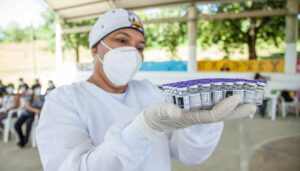
JACKSONVILLE, Florida – In a groundbreaking fusion of medicine and space exploration, Mayo Clinic physician and researcher Dr. Abba Zubair is pioneering studies in microgravity that promise significant advancements in the treatment of cancer, stroke, and bone loss. His research, conducted aboard the International Space Station (ISS), leverages the unique conditions of space to explore new medical frontiers.
Dr. Zubair’s work aims to harness the distinct environment of space for the benefit of both astronauts and people on Earth. “The goal is to harness the uniqueness of the space environment for the betterment of humanity, be it on Earth or in space,” Dr. Zubair explains. “We wanted to take advantage of the environment at the International Space Station to study how it affects human physiology.”
Exploring Stem Cells in Microgravity
The absence of gravity, along with the impacts of radiation and vacuum, are key aspects of space that Dr. Zubair is investigating. Since 2017, he has launched three research projects to the ISS, with more planned. As a specialist in regenerative biotherapeutics, Dr. Zubair focuses on adult stem cells, particularly mesenchymal stem cells, which are crucial for future stroke treatments.
“I also know how challenging it is to grow them in the lab. One of the first fundamentals is to see how the absence of gravity influences how stem cells divide and the growth rate,” Dr. Zubair explains. “We wanted to see whether cells grown in space are any better or grow faster than cells grown in the lab.” His initial findings revealed that the absence of gravity affects stem cells, but the impact varies by cell type.
This discovery led to further research on how mesenchymal stem cells contribute to bone formation and osteoporosis. Astronauts, despite rigorous exercise, often suffer from bone density loss, a phenomenon Dr. Zubair is eager to understand better.
Space Research and Cancer Treatment
Dr. Zubair’s research extends to leukemia stem cells, exploring how these cells react to the space environment. “We are also working to understand the impact of space radiation, from the angle of how we can mitigate the effect of radiation and prevent cancer,” he says. “In the long run, we really want to protect astronauts, especially during long-term space travel, such as to Mars, where they would be deep in space and away from any magnetic field protection that we get from Earth.”
This research could also benefit Earth by offering insights into protecting cells from radiation exposure, such as during nuclear accidents. Additionally, Dr. Zubair’s findings may influence treatments like CAR-T therapy and bone marrow transplants for cancer patients.
“If we can understand how stem cells in space, especially hematopoietic stem cells, expand and differentiate to make immune cells like T cells, microphages, we will learn how to make them more efficiently,” Dr. Zubair says.
The Future of Space-Based Medical Treatments
Dr. Zubair envisions a future where space could become a hub for certain medical treatments. If cancer cells proliferate more in space, they might become more susceptible to chemotherapy. “If that is the case, that absence of gravity can induce leukemia cells or other cancer cells to go into cell cycle, that makes them susceptible to chemotherapy,” he explains. “So instead of giving the chemo on Earth, you might go into space where the absence of gravity makes the cancer cells more vulnerable to chemotherapy. That is definitely something that I would love to explore.”
While replicating a microgravity environment on Earth poses challenges, Dr. Zubair believes it is technically feasible. The potential for space-based medical treatments could revolutionize how we approach diseases that are currently difficult to treat on Earth.
Implications and Next Steps
The implications of Dr. Zubair’s research are profound, offering new hope for treating diseases that affect millions worldwide. His work not only advances our understanding of human physiology in space but also opens new avenues for medical treatments that could one day be standard practice.
As Dr. Zubair continues to send projects to the ISS, the medical community eagerly anticipates the results, which could reshape our approach to some of the most challenging health issues of our time. The intersection of space research and medical science is proving to be a fertile ground for innovation, with the potential to improve lives both on Earth and beyond.







